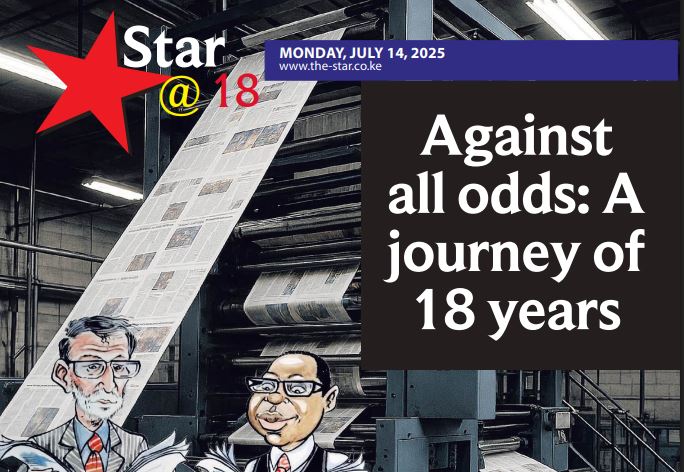![[PHOTOS] The Star celebrates 18-year anniversary](/_next/image?url=https%3A%2F%2Fcdn.radioafrica.digital%2Fimage%2F2025%2F07%2F182ba213-2966-4935-83f2-db2115eec536.jpg&w=3840&q=100)
[PHOTOS] The Star celebrates 18-year anniversary
Top executives led staff in a cake-cutting event to celebrate milestone
While the newspaper landscape has changed a lot since the heady days of 2007, the power of print endures
In Summary

Audio By Vocalize

The Star started with a bang in 2007, shaking the newspaper industry with the story: ‘I helped nuns to get abortions — assistant minister’.
The ensuing political, religious and social uproar surpassed the impact of popular radio stations, proving Radio Africa Group was not complete without print, and that a niche could be found in a market with a duopoly.
Within three years of the Star hitting the streets, cofounder Patrick Quarcoo no longer needed an alarm clock. As he recounted in an interview with Columbia Journalism Review, “People wake me up at 6am to rant and rave, even about inside stories.”
One inside story that caused a sensation was broken in 2010 on Word Is, a section that reflected the paper’s early focus on lifestyle and entertainment. ‘Esther Arunga, Hellon in cult controversy’ it was titled, sending shockwaves across the country as it marked the beginning of a downward spiral by the beloved TV queen.
Come 2012, a whole Deputy Chief Justice fell from grace as well, in what was precipitated by the Star reporting about her gun drama in a story titled: ‘Nancy Baraza pinches guard’s nose in Village Market’. Amid public furore, she was suspended by the then President Mwai Kibaki and subjected to a tribunal probe, before eventually resigning.
Three years later, in 2015, a Cabinet Secretary got a dose of the same medicine after the Star drew attention to some Sh791 million expenditure at the National Youth Service on overpriced items, including sex toys.
Anne Waiguru denied any money was lost, with President Uhuru Kenyatta forced to fight the perception of protecting her in what the Star colorfully headlined: ‘Waiguru is not my girlfriend’. But after two months of backlash, she stepped down. She was, however, cleared by the EACC in 2016 and she reinvented herself in elective politics in 2017, becoming one of the pioneer female governors.
In more recent times, the Star was the first to report (in January last year) that opposition leader Raila Odinga was vying for AU chairman, and that President William Ruto was backing him over his predecessor Uhuru Kenyatta.
This narrative dominated the media for a year, until Raila’s bid ended in an upset in February.
Many more are the exclusives the Star has reported over the years, but these are the pick of the bunch in terms of stories that were subsequently picked by the competition and set the agenda.
And while the newspaper landscape has changed a lot since the heady days of 2007, the power of print endures.
Stories come and go on radio and TV and can be pulled down or amended online, but ink on the paper lingers. It’s what keeps politicians up at night — and awakens CEOs
![[PHOTOS] The Star celebrates 18-year anniversary](/_next/image?url=https%3A%2F%2Fcdn.radioafrica.digital%2Fimage%2F2025%2F07%2F182ba213-2966-4935-83f2-db2115eec536.jpg&w=3840&q=100)
Top executives led staff in a cake-cutting event to celebrate milestone